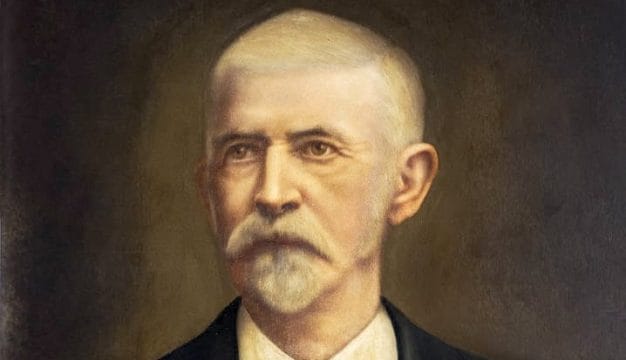James McCrory
James McCrory (1758-1840) is most remembered for his service in Gen. George Washington’s Life Guard, a small unit of selected soldiers from the Continental Army tasked with protecting Washington during the American Revolution. By 1820, he had emigrated to Alabama, where he was one of the first settlers in Vienna, a small settlement in Pickens County, near Tuscaloosa, Tuscaloosa County, and engaged in planting cotton and trying to claim his veterans’ pension and land grant.
McCrory was born on May 15, 1758, in the small Irish village of Larga to Thomas McCrory and Hannah McCrory. With his parents and three brothers, he sailed from Belfast, at just 17 years old, to Baltimore in the Province of Maryland, landing on July 1, 1775. He later migrated further south to North Carolina, where he enlisted as a sergeant in the Continental Army on April 15, 1776. McCrory served under the leadership of his brother Thomas, a captain in North Carolina’s Ninth Regiment that joined General Washington’s command in Middlebrook, New Jersey.
McCrory’s service quickly led to a promotion to ensign and eventually caught the attention of his commanding officers, who recommended his service to Washington’s “His Excellency’s Guard,” or “Life Guard,” as it was more commonly referred. Among the more notable battles in which he took part were the Battle of Brandywine on September 11, 1777, and the Battle of Germantown on October 4, 1777, both in Pennsylvania. Washington was defeated in both by Sir William Howe but escaped with much of his army. McCrory stayed in Washington’s service during the army’s march to and encampment at Valley Forge during the winter of 1777-78.
He remained in the army after serving in the Life Guard and moved south at some point, joining colonial forces in the southern theater of the war. He was at the August 15, 1870, Battle of Camden, South Carolina, a defeat for the colonists under Gen. Horatio Gates. Records and testimonies indicate that McCrory also faced capture and imprisonment during his service. It is believed that in February 1781, he was captured by British lieutenant colonel Banastre Tarleton and held prisoner on a ship in the waters near Wilmington, North Carolina. Tarleton had cultivated a reputation during the war as one of the most feared and brutal of Britain’s generals. He is believed to have placed captured American soldiers in cruel and inhumane conditions and even ordered the executions of those who surrendered. McCrory’s imprisonment lasted an estimated four or five months before legend says he escaped by jumping overboard and swimming to freedom. Although the circumstances of his return remain unknown, McCrory did rejoin the army once freed. Some sources state that he fought at the March 15, 1781, Battle of Guilford Court House in North Carolina, but this conflicts with his later testimony that he was taken prisoner on February 24, 1781.
After serving in the Army for six years, McCrory received an honorable discharge in the spring of 1782. He then returned to Guilford, where he wed Jane Gilmore on February 28, 1782. The couple relocated to Tennessee in 1784 to begin raising their family, which eventually included 12 children. As of the 1810 Census, he was in Bourbon County, Kentucky. In 1820, the family settled in Vienna, a small settlement located in present-day Pickens County, near Tuscaloosa, on forty acres deeded to him by the federal government. McCrory bought several hundred additional acres and began cultivating cotton, likely with the use of enslaved labor, as a small number of enslaved individuals are listed among his household in the 1830 Census.
Little is known of his life in his later years other than he remained in Alabama with his family, living off his farming profits and his military pension of $240 per year, which he was finally granted on June 13, 1829. Indeed, McCrory encountered much difficulty claiming his military pension and his “bounty-land warrant,” or tract of public land granted to Revolutionary War and later veterans for their service. He apparently didn’t make these applications while in North Carolina and never returned to the state. He would later testify before Washington County court officials in 1820 in an attempt to claim his bounty-land warrant. He attested to his years of service, his capture on February 24, 1781, and five-month imprisonment. His brother Hugh, in Tennessee, also affirmed that he was captured with James in 1781 in support of James’s effort to retrieve his pension.
Although North Carolina granted him his bounty-land warrant of 2,560 acres of public lands, the amount due to someone of his rank, in 1820, it appears from some historical records that he did not receive title to the land until 1839. In support of his land grant application, the Secretary of State for North Carolina wrote to the Washington County court in 1829 and 1836 confirming McCrory’s date of enlistment, promotion to ensign, and status as a prisoner and repeated the same to the Secretary of State of the U.S. Senate in 1839. Federal legislation regarding the title took several years to move through Congress and was signed by Pres. Martin Van Buren that year, though only after additional testimony from McCrory and the assistance of a lawyer. McCrory died on November 24, 1840, and was buried next to his wife a few miles south of present-day Aliceville at the Old Bethany Primitive Baptist Church.
Further Reading
- Owen, Thomas M. Revolutionary Soldiers of Alabama. Bulletin No. 5. Montgomery, Ala.: Brown Printing Company, 1911.
- Ress, Thomas J. “James McCrory: Alabama's Revolutionary War Hero.” Alabama Heritage 103 (Winter 2012): 4-6.






